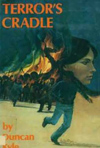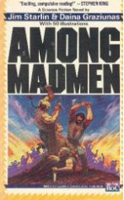
Whew! This was a challenging book. It's a good book, too, but I can't say I really enjoyed it as I was reading it. It's too bad, because Peter Watts is an intelligent and interesting writer. I loved his first book,
Starfish, and liked the follow-up to that
Maelstrom. I still have two more books to read in that series, but the
Mt. Benson Report got me Blindsight for xmas (much appreciated!) and it is a stand-alone book.
Blindsight takes place quite far in the future. You only get snatches and glimpses of what it is like on earth, but technology is advanced enough that it's considered deviant to have sex outside of the virtual world, terrorists use genetic bombs that can cause people's bodies to start growing a new skeleton (thus tearing them apart), and people's brains can be transferred to other bodie or connected directly to virtual realities where they spend their entire lives. One day, earth is surrounded by what looks like a giant meteor shower. A skyfall of exploding stars. Nothing beyond that happens, but the scientists of earth believe that our planet has just been photographed. This causes a great deal of concern. By the slightest chance, an anomaly is discovered outside of Jupiter. A ship is sent out to investigate.
The story of Blindsight takes place on the ship, whose captain is a vampire (literally; an actual other species living on earth) and whose crew includes a female military officer, who can control entire brigades of drone soldiers with her mind, an expert in languages and communications, who deliberately split her own personality into 5 separate ones, a scientist who is half diagnostic computer system and half human and finally, the protagonist, a sociopath (though this greatly simplifies his personality complex) responsible for observing the whole operation and reporting it neutrally back to earth. Of course, everybody else on the ship hates him, because they feel like he is always spying on them.
The anomaly is some kind of alien thing, but so profoundly different that they can barely understand even how to approach it. The story is divided between their stumbling attempts at contacting and learning about the alien presence and the psychological conflicts and developments on the ship. As you can see, it is a really cool setup, extremely well thought out. Though some of the concepts above might sound quite fantastical and over the top in my description, the book is without a doubt, hard sci-fi and all the conceptions are based on established scientific theory (and extremely well-researched; as usual the end of the book has pages of explanations, heavily footnoted and this was cut down from the original appendix, which you can find on the website).
Watts is no joke. He's an intense, intelligent, radical-thinking person. You can see that his personality is potentially quite combative in his notes and he doesn't pull his punches. He is also someone who doesn't shy away from difficult morality and the painful side of human psychology. I respect his writing for these things. But boy can it make for a lot of work! The book is not that long and moves quickly, it's not even that dense, but there is so much complexity, so much vocabulary and implied ideas that you really have to concentrate. On top of that, there is no happiness in his world. Humans are barely capable of perceiving anything outside of their own existence, let alone connect with another human. So it isn't a joyful ride! And there are some profoundly dark and disturbing moments, where you are just feeling, ugh and hesitant to continue forward. Watts addresses the human capacity for cruelty more directly than even Banks, I would argue, and it is not pretty.
Ultimately, the presentation of the alien being and the evolution of our technological world are convincing and fascinating. I got a lot to think of out of this. The book is a success. But it is a challenging one. I recommend it, but be prepared to work a bit. If you find most sci-fi way too fluffy and positive, then I would strongly recommend it. This is original and daring and in a sea of lame ideas, that alone is worth supporting. But beyond that, Blindsight is a dark and despairing look at the profound solitude that human existence can be, both at the personal and galactic level.
 I picked this one up for 50 cents at a bookstore on St. Catherine. I have always considered Duncan Kyle the poor man's Desmond Bagley. Both are Scottish and both wrote succesful solid, manly thrillers in the 60s and 70s. I think I should probably give Kyle a little more credit. He just didn't have the same publishing clout as Bagley, whose books are produced in nice consistent thematic runs, so they look really cool on your shelf. But Kyle is good, competent. Normal, british-tough, realistic men getting caught up in dangerous situations.
I picked this one up for 50 cents at a bookstore on St. Catherine. I have always considered Duncan Kyle the poor man's Desmond Bagley. Both are Scottish and both wrote succesful solid, manly thrillers in the 60s and 70s. I think I should probably give Kyle a little more credit. He just didn't have the same publishing clout as Bagley, whose books are produced in nice consistent thematic runs, so they look really cool on your shelf. But Kyle is good, competent. Normal, british-tough, realistic men getting caught up in dangerous situations.  I feel like this was a cool Post-apocalyptic find. S.W. Welch's, the stalwart used bookstore on the Main, right across the streets from Schwartz's is moving (sad days as the Main slowly transforms) and they had a big $1 sale. There really wasn't any real treasures, but I found a few neat things, including this little gem, a novel with illustrations ("A unique new form of novel" or something like that it says on the back).
I feel like this was a cool Post-apocalyptic find. S.W. Welch's, the stalwart used bookstore on the Main, right across the streets from Schwartz's is moving (sad days as the Main slowly transforms) and they had a big $1 sale. There really wasn't any real treasures, but I found a few neat things, including this little gem, a novel with illustrations ("A unique new form of novel" or something like that it says on the back). I've had a few recommendations to read Chuck Palahniuk. It was the one that came after the 4th pitcher, along with the argument that he writes concisely, that convinced me to actually give him a try. The specific book (Lullaby) in question wasn't available at the library, so I took out Diary.
I've had a few recommendations to read Chuck Palahniuk. It was the one that came after the 4th pitcher, along with the argument that he writes concisely, that convinced me to actually give him a try. The specific book (Lullaby) in question wasn't available at the library, so I took out Diary. 



